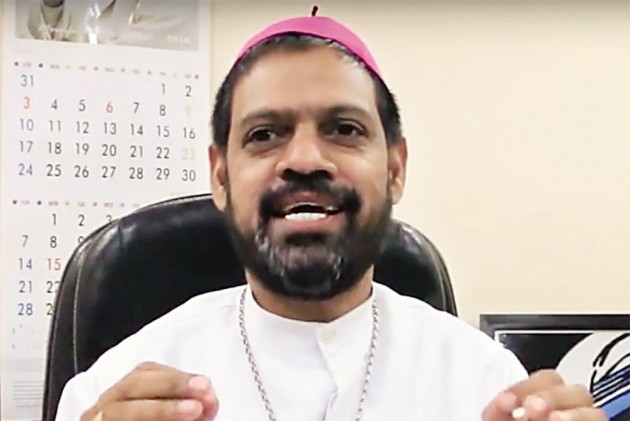“we Are Trying to Fix Our Policy on Sexual Harassment”
By Anoo Bhuyan
Why does the Catholic church appear to protect its clergy accused of murder and rape? For instance, in the case of Sister Abhaya’s murder, why does the Church go out of its way to defend, protect and rehabilitate the accused, ridiculing the due process of law? Palanivel Jeyapaul, who pleaded guilty of molestation in the US, was even reinstated and is back as a priest in India. Another priest, who is now convicted of rape in Kerala, was allowed to celebrate the mass on an auspicious day even after being accused of rape, dividing the parish down the middle. Are these attempts to put the laity down and turn them into second class citizens without any rights? Why does the church rehabilitate convicts like Fr Lazar of the Kollam diocese? In a telephonic conversation with Anoo Bhuyan, Bishop Theodore Mascarenhas, secretary general of the Catholic Bishops’ Conference of India (CBCI), declined to answer questions on specific cases, but talked about the church’s position on such matters. Excerpts: What is the official position of the Catholic church in India on cases of sexual abuse by the clergy? We are totally against any sexual offence. It is not according to Catholic teaching. We are against any form of disrespect to the dignity of women, not just harassment or rape. If we have failed in any way, we would apologise to the people we have hurt. That is the official position. This is why we are working on our own sexual harassment policy at work. CBCI is coming out with a document within a month. In what you have just said, there is an acknowledgement of these crimes taking place. According to the Vishakha guidelines, every workplace is supposed to have a policy to deal with sexual harassment. What is the shape of CBCI’s policy on this? The policy is zero tolerance for sexual harassment. We want it to be easy to implement. We will have monitoring cells and complaint cells at diocese or institution level. We want to respond to complaints speedily too. We are interested that all employees are educated about their role and the respect they should show to other humans. We have also started implementing POCSO at our institutions. We are moving from school to school to make the staff POCSO-compliant. Besides punishment, I feel proper education has to take place in society. We have cases within the Catholic church just as outside in the society. The Vishakha guidelines came from the Supreme Court in 1997. Some of the biggest cases of sexual abuse in the church are decades old. Isn’t this response from the church late and lethargic? I have spent the last 21 years in Rome and have just come back to India. How can I answer what action has been taken and what has not? The whole country is affected by a certain malaise. The real question is why the law takes so long to deliver justice in the country. Is this the fault of society’s “malaise”? But doesn’t the church believe in being ‘in the world, but not of the world’? Shouldn’t we expect better standards from the church? When I said it is a malaise in society, I was not defending what is happening. We apologise for whatever might have happened and we would not like it to happen again. And we are trying our best to implement whatever has to be implemented in the best way it can. But you are picking a few rare cases. They remain rarest of the rare. We do not want even these to happen. In several cases, the victims—women and children—are weak and vulnerable, while the Catholic church is powerful at many levels. The victims have been persecuted while the priests have been safeguarded. You said the law is slow, so how fair is it to expect victims to simply go to court? No, it is not simply about going to court. We have to clean up our mistakes too. I think the power of the church is often exaggerated. We want to use our moral power so that society can be clean. I don’t think it is true that we use our power to cover up facts. You can’t take a few examples and colour everybody. The church is often the most humiliated in the press. That’s because the church has a higher pedestal, so minor transgressions will be magnified. In this case, give me a counter story. Tell me a case where the victim has been supported by the church and the accused priest has not been protected. What we have instead are cases like that of Palanivel Jeypaul, who pleaded guilty of molestation in the US but was reinstated as a priest in India. How can I give you a counter case when most cases are dealt with on a confidential basis. Also, I am not the right person to speak to on cases like this as they are under the local areas. What about the moves to canonise Father Onamkulam, who was sentenced to death by a sessions court in the murder of Mariakutty. So is there a counter story to this trend, where the church came down heavy on a priest? I have returned to India only recently and recently taken charge. I do not have all the material available with me right now to respond to you, as I am on the road and travelling in Ranchi. We are sorry for where we have failed and we are trying to fix our policies now.
|
.
Any original material on these pages is copyright © BishopAccountability.org 2004. Reproduce freely with attribution.
